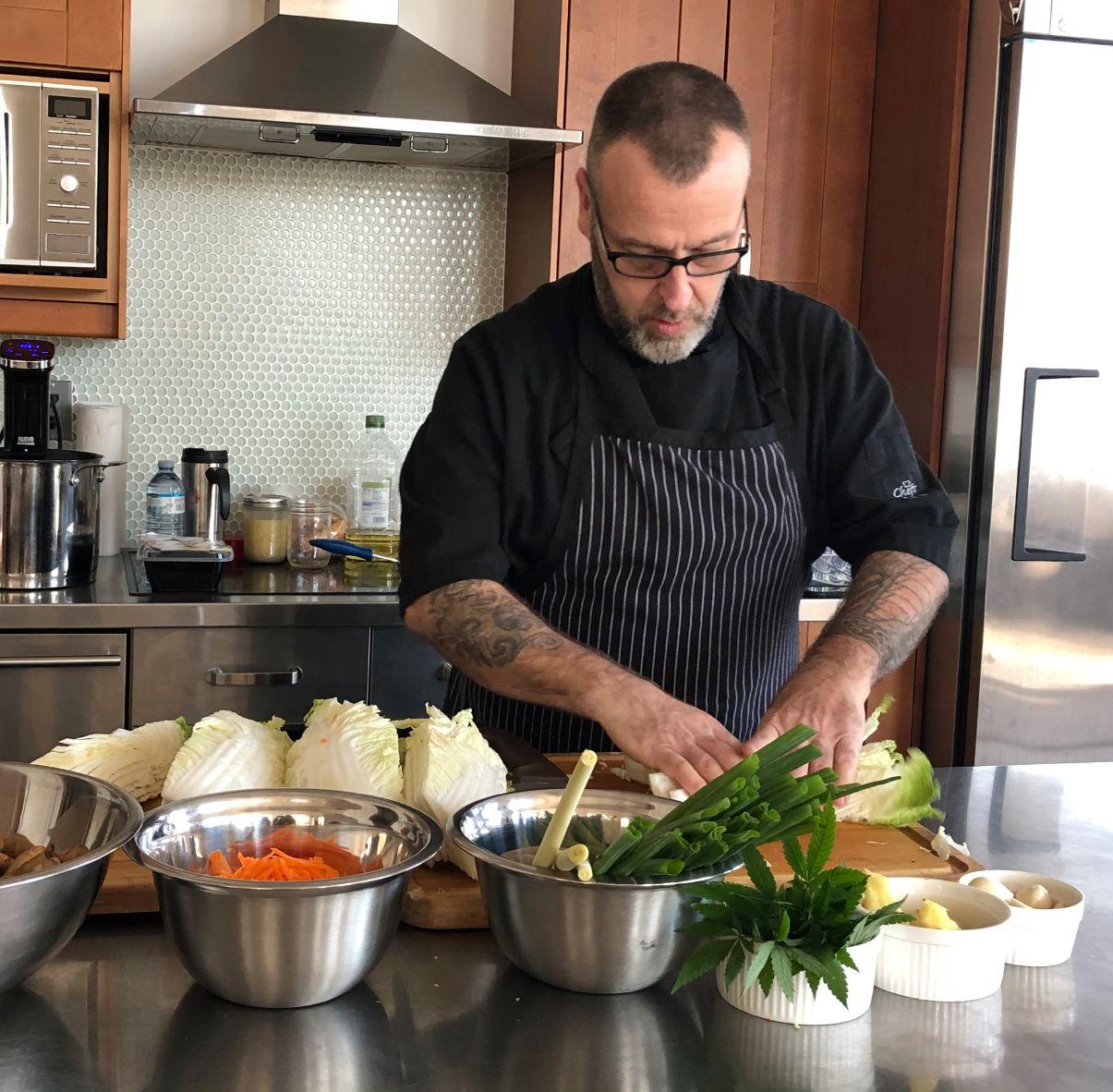

SPECIAL DIGITAL

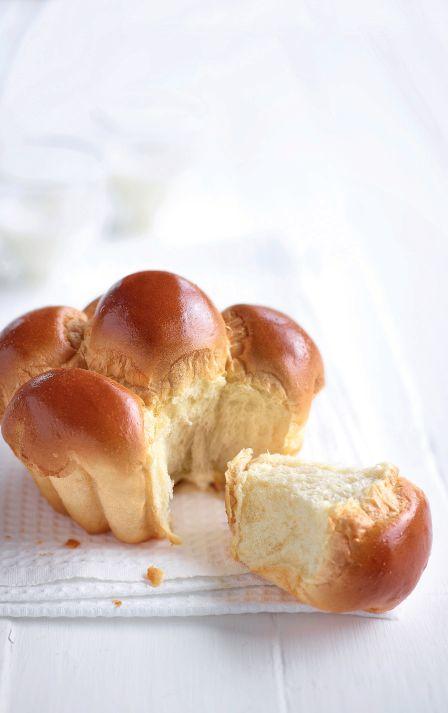
Plant-based is the way forward


As consumers continuously strive for healthier lifestyles, turning more towards a plant-based diet has become a food choice for overall better health and sustainability. In fact, the Taste Tomorrow global survey revealed that 60% of Canadians want to incorporate a more plant-based/vegan diet. This explains why the demand for plantbased food options is growing, including plant-based baked goods.
We believe that plant-based baking should not have to be a challenge. Within Puratos we offer plant-based* suitable solutions to help you cater to plant-based diets with your creations (*they do not contain any animal-derived ingredients).
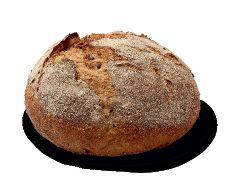



1.800.668.5537
WHAT THE HEMP?
Demystifying the Potential of a Power Plant—and Its Functional Future in Bakery
The buzz created across the country by the Cannabis Act has quickly evolved into a rapidly expanding market opportunity for the once-banned substance. With ongoing legislative changes and controversial consumer perceptions related to cannabis, manufacturers are challenged by the uncharted marketplace that requires continued consumer education and the demystification of the term ‘cannabis.’ As a result, industrial hemp is being held back from making it mainstream—for now.
HEMP VS. MARIJUANA: CLEARING THE SMOKE
Sharing the same broad classification of cannabis, hemp and marijuana are virtually identical in appearance with overlapping cultural references that have resulted in consumer confusion. The defining characteristic that separates the two is the amount of THC in the plant. Simply put, consumers want to know: will consuming hemp-based products produce a psychotropic effect? The answer is no.
In a consumer-driven economy where demands for plant-based protein, functional foods, and sustainability are soaring, industrial hemp is on the verge of a major growth phase. In fact, hemp as a food ingredient alone is seeing 15-20 per cent growth year on year.
FUELLING THE GROWTH OF INDUSTRIAL HEMP
After 70+ years of prohibition, the oldest industrial crop in the world is making its way to mainstream following the tailwinds of several growing trends. While Mintel Purchase Intelligence shows lower cross-category purchase
HEMP VS MARIJUANA
Non-intoxicating Can induce psychotropic/euphoric effects
Contains <0.3% THC Contains >0.3% THC
U.S. HEMP-BASED PRODUCTS SALES, 2014-2022
$2,000
$1,800
$1,600
$1,400
$1,200
$1,000
$800
$600
$400
$200
$0
Source: Hemp Business Journal estimates ($ mil. consumer sales)
intent for products containing hemp-de rived ingredients, the research also showed that the younger demographic understood hemp to be ‘very healthy for you’ with an increased willingness for trial—equating to a ripe market opportunity of nearly 40% of Canadians.
Simultaneously, the increased consumer focus on personal wellbeing and global sustainability further supports the anticipated growth of industrial hemp.
GREEN IT UP
° More than 40 per cent of the population is actively trying to incorporate more plant-based foods into their diets.
THINK BEYOND MEAT
° Alternative proteins, including plant-based proteins, is expected to grow at 14 per cent annually by 2024—up to 1/3 of the Canadian protein market.
FOCUS ON FUNCTION
° Consumers report increased intent to purchase functional foods to support top personal health priorities including weight management (51 per cent), stress (51 per cent), energy (39 per cent) and sleep (38 per cent).
So, with converging consumer trends and recent legalization, why is hemp taking so long to hit the mainstream in
HEMP FLAX
Vitamins & Minerals†† Vitamin B, B2, calcium, magnesium, copper, potassium, phosphorus
Vitamin B, B6, calcium, copper, iron, magnesium, phosphorus, potassium
CHIA
Vitamin B, B2, B3, calcium, iron, magnesium, manganese, phosphorus, selenium, zinc
†Protein/carbohydrate/omega values based on 50g serving across an average of 3 sources/ brands
††Vitamin/mineral inclusion based on Canadian Nutrient File—Health Canada
Canada? My suspicion is that confusion in the industry created by the Cannabis Act has slowed our understanding and adoption of hemp-based products to deliver on current consumer trends.
SO, WHY HEMP?
Hemp provides a gluten-free, non-GMO alternative to other plant-based proteins. Suitable for vegans, vegetarians and flexitarians alike, hemp is a nutrient-rich option for anyone looking to boost dietary protein without having to consume whey, soy, or a steak. When comparing to other buzz-worthy power plant products, like chia or flax seeds, hemp delivers stronger claims and nutrient profiles—which should resonate with 48 per cent of consumers reporting that they always/regularly read labels.
HEMP-INSPIRED PRODUCT DEVELOPMENT
Protein Powder
Hemp protein powder is digestible and offers a low-carb, protein-rich, high-infibre protein source that is packed with healthy omega fatty acids.
° Application: Convert traditional bakery items into protein power sources. Add hemp protein powder to increase protein in breads, brownies, cakes, muffins and other baked goods.
DE-HULLED HEMP SEEDS
Also known as hemp hearts, not only are hemp seeds one of the best sources of vegetable protein in the world, but they are also highly versatile, easily digestible—and they taste delicious.
° Application: Sprinkle, mix, top and spread! Incorporate them into your baked goods—or use them as a topping on muffins, loaves, or breads.
HEMP OIL
Hemp oil is harvested by cold-pressing hemp seeds and provides a natural source of fatty acids, terpenes and proteins. At present, in order for hemp-seed oil to be exempt from the
}health conditions, including the management of anxiety, depression, inflammation, acne, sleep disorders, heart disease and chronic pain.
In Canada, CBD and products containing CBD are subject to all of the rules and requirements that apply to cannabis under the Cannabis Act—regardless of origin. The Cannabis Act and its regulations do not distinguish between CBD derived from industrial hemp and CBD derived from cannabis with greater than 0.3% THC. What you need to know:
• Claims: Given the limited availability of peer-reviewed studies, on-label claims are heavily restricted with respect to messaging relating to CBD’s efficacy in the treatment or support of health conditions.
• Psychotropic Effect: Regardless of source, CBD will not ‘get you high’. However, hemp-derived CBD allows you to maintain a THC-free claim on your label.
• Dosage Limitations: With <0.3% THC,
Hemp-based CBD is non-psychoactive, making it a safe and effective option for people who may be concerned about the mind-altering effects of other cannabinoids, such as THC.
Cannabis Act, it can’t contain more than 10 ppm of THC.
° Application: Functional culinary hemp oil can be used as an edible ingredient, but at this time has limited exposure to the baking category. Explore hemp oil in brownies, bread or muffins and enjoy the nutty flavour possibilities—it could be the next coconut oil!
HEMP-BASED CBD
Cannabidiol (CBD) has been celebrated for its far-reaching medical applications—and has been linked to supporting the relief of symptoms of anxiety and pain. Hemp-based CBD is non-psychoactive, making it a safe and effective option for people who may be concerned about the mind-altering effects of other cannabinoids, such as THC.
° Application: CBD products have been used to support a range of
Health Canada does not impose dose restrictions or maximum inclusion rates in hemp-based CBD products.
• Licensing: In Canada, CBD falls under the Cannabis Act—the same legislation established by Health Canada to manage licensing for all cannabis-based products.
• CBD and Sport: Unlike other cannabinoids—including marijuana and THC— CBD is not listed on the World Anti-Doping Agency’s Prohibited List and is permitted to use in sport.
• Available Forms: Extracted from the cultivated flower of the cannabis plant, CBD can be processed to be available as an isolate, distillate, or crude oil for inclusion into consumer products.
• Application: CBD can maintain total functionality when being incorporated into consumable products. That said, if considering inclusion of CBD into your product development pipeline, always
seek guidance to ensure your production process doesn’t compromise your product efficacy.
THE FUTURE OF BAKING IS FUNCTIONAL
As consumer perceptions continue to evolve with increased education, product availability, and continued legislative changes, the future of hemp is bright. While CBD and products containing CBD remain solely available for sale through authorized cannabis retailers in Canada, ongoing changes in the
legislation relating to edible cannabis will continue to evolve as additional research and peer-reviewed studies become available. With the increased consumer focus on sleep and mental wellbeing, there is a lot of exciting research underway on the effect of CBD on the management of stress and anxiety.
Prediction: While distribution is currently restricted, it’s not too early to start thinking about CBD-infused baked goods to deliver on consumer acceptance
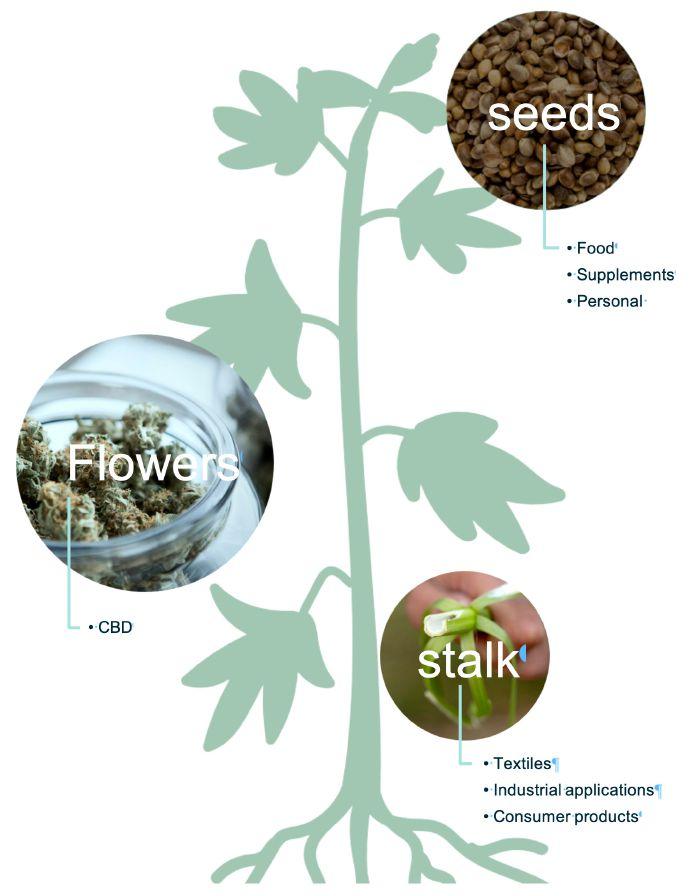
of food as medicine. With this increased investment in research to help back product claims, it would not be shocking to see a plethora of CBD-infused ingredients finding their way onto mainstream product labels in the near future.
According to Ipsos, the average Canadian consumes 10 snacks per day— with 66% of all consumption occasions occurring in between meals. These statistics offer an amazing opportunity to incorporate hemp into products that promise to deliver on increased protein and plant-based consumer demands.
Prediction: With consumers looking for good-for-you snack options, I expect we’ll start to see an emergence of hemp-infused bakery products that promise consumers increased protein or functional benefits. Hemp presents and exciting opportunity for bakery, as it opens up new possibilities for the category to promote crave-worthy products that are both functional and available in single-serve portions.
In recent years, cannabis has been one of the most buzz-worthy topics across North America. Given its entwinement with the controversial topic, hemp is benefiting from the media exposure— consumers are curious, and manufacturers are taking notice.
Prediction: On the cusp of many converging consumer trends, both social and traditional media channels will demystify hemp at an unprecedented pace. Hemp is in the limelight and as consumers become more informed on its health benefits, we will see increased acceptance—and subsequent demand— for hemp-based products. Manufacturers who are exploring possibilities with this power plant are sure to benefit from the anticipated growth of industrial hemp. The future belongs to the curious. /BJ
Ben Carnevale, BSc, Food Scientist, Blendtek Ingredients.
COOKING UP THE FUTURE OF EDIBLES
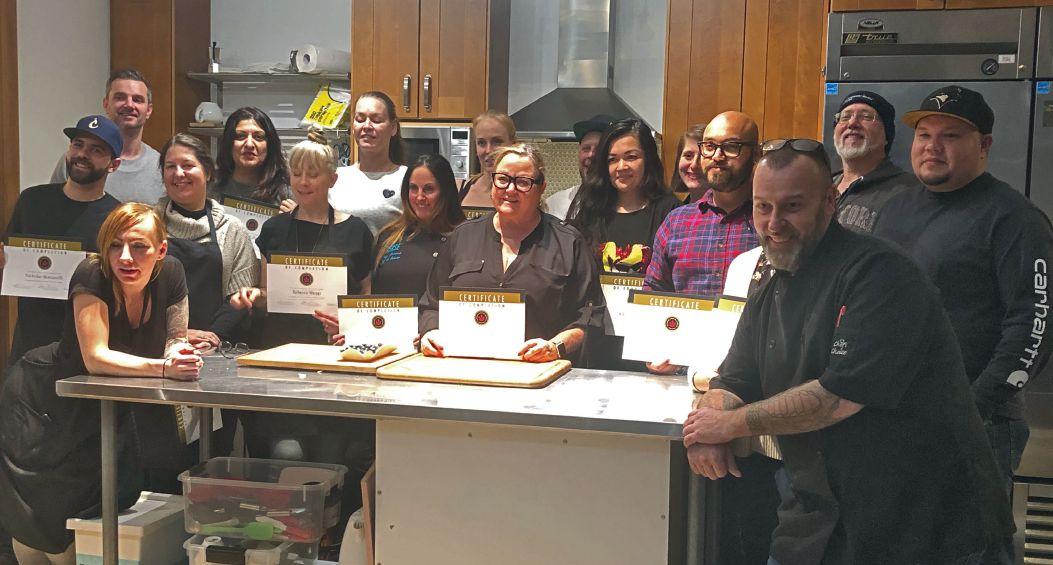
Cannabis 2.0 has opened the doors to a new wave of products that are expected to inject $2.7 billion into the Canadian market in the first year. According to Deloitte’s 2019 study, edibles and infused beverages are the top two product types that Canadians are most eager to try. Together, edibles ($1.6 billion) and infused beverages ($529 million) are said to account for $2.1 billion or almost 78 per cent of the total revenue.
Major brands from across the country have been gearing up for extracts legalization for years. Leading up to Oct. 17, 2019, cannabis brands were doubling down on research and development to be ready for their own infused products to launch in 2020.
Outside of the industry, major food brands, like Edible Arrangements,
Molson Coors and Constellation Brands, were racing to partner with Canadian cannabis producers so that they could get their own piece of one of the fastest growing industries in the country.
With the diverse potential of this new range of product types, Grow Opportunity looks at the different ways the industry is leveraging Canada’s newest food trend.
THE HIGH LIFE
Luxury cannabis bars and cafés are cropping up in trendy neighbourhoods all over the country, but byMinstry wants to make its name as Canada’s high-end cannabis lifestyle hub.
Last summer, Tokyo Smoke co-founder Lorne Gertner announced his plan to build a new kind of cannabis space on the same foundations as the original Tokyo Smoke café in downtown Toronto. The 8,000-square-foot future home of
byMinstry on Adelaide Street will have three dedicated spaces for food, art and design.
The flagship location was slated to open in late 2019 but construction has forced the company to postpone its opening to Winter 2020. Still, buzz for this upcoming high-end, high-culture space continues after the announcement that top chef Ted Corrado will be joining its executive team.
Corrado is a former executive chef for the Drake Hotel, Drake Commissary and Drake Devonshire. Now as byMinistry’s culinary director, Corrado is in charge of building the “cannabistronomy” hub for the lounge. He will also be developing the brand’s new cannabis culinary school, Lab byMinistry.
The first of byMinistry’s culinary experiences include an Enlightened Dinner Club, which launched in
The first graduates of The Cannabis Cooking Company’s certification program
February this year. These private dinner parties – which are only revealed to exclusive members of a mailing list –take place in trendy design studios across the city. These dinners, Corrado says, are aimed at educating guests about removing stigmas through design-forward experiences.
“Standing outside, smoking a joint isn’t where I’m at right now,” says Corrado. “I want a beautiful experience. I want to sit down and have a great meal. I want the perfect playlist and have a beautifully-designed space. That’s what I’m looking for my cannabis experience to be.”
Even before he was hired to be part of the byMinistry executive team, Corrado has curated many private cannabis dinners himself. In fact, cannabis-infused dinner parties aren’t new to fine-dining chefs. Many cannabis-trained chefs find that curating dinner experiences for an intimate crowd is a great opportunity to safely experiment with cannabis as a food ingredient.
“Beyond flavour profile, you’re looking at what effect the plant will have, as well,” says Corrado. “Depending on where a dish fits into the course of an evening, I’m looking to create that experience for the guest… sativas and
}COOK IT YOURSELF
For those who cannot afford the $100 to $200 price tag of a private cannabis dinner, home cooks have been concocting their own infusion recipes through trial and error. The Cannabis Cooking Company is looking to alleviate that guesswork for people through its hands-on workshops.
Lead cannabis chef and instructor Don Gingrich has been cooking with cannabis for almost 30 years. As a cancer survivor at a young age, Gingrich turned to medicinal cannabis to alleviate the painful symptoms of his chemotherapy. He remembers his first edibles recipe, which was a brownie recipe he developed with some chopped up pieces of his homegrown plant.
“Back then, we didn’t decarboxylate or anything like that… We didn’t strain anything, it had stems and seeds and all sorts of stuff. It tasted like weed but it worked,” laughs Gingrich. “It was a lot of trial and error, but once we narrowed down on the math, my wife and I now make caramels and all sorts of stuff.”
Gingrich says in this new era of legalization, trial and error doesn’t have to be people’s starting point anymore. Every week, classes are led by trained
“I want a beatiful experience. I want to sit down and have a great meal. I want the perfect playlist and have a beautifully designed space. That’s what I’m looking for my cannabis experience to be.”
hybrids to start off your evening and CBDs to end a menu or a meal.”
As infused food experiences start to become the “new normal” in the industry, Corrado says he is looking forward to more innovations in producers and extraction companies. As a chef, he said that having reliable infused pantry products, like flour, sugar, salt, butter and oil, will be a huge next step for the food industry.
“Chefs are creatures of habit. If we like something, we will go back to it over and over and over again,” he says. “I want to be able to buy that exact same strain and make sure that it breaks down in the same way, that the DNA of that strain is the same. I don’t think we’re there with cannabis right now. The strains are a bit all over the place.”
chefs, cannabis sommeliers and experts to teach participants about the decarboxylation process of infusing CBD and THC into olive oil. They also learn micro-dosing their food with a controlled amount of THC to ensure a pleasant experience throughout the meal. Then, Gingrich leads the class through simple recipes that can incorporate the infused oil in a variety of dishes.
“For example, today we’re pairing the limonene in the plant and pairing it with the earthiness of mushrooms and adding some lemongrass, as well,” explains Gingrich as he furiously chops herbs to prep for the class’s potstickers recipe. “Sourcing our viable cannabis, I look for something that is stocked with a high amount of terpenes, high THC, you’re looking for organic, mould-free, fun-
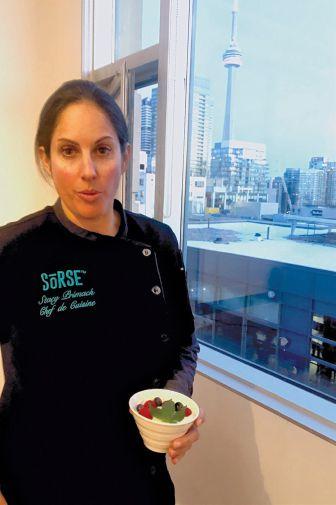

or
gus-free… no different from picking out produce, it’s the same thing.”
The Cannabis Cooking Company sees its role mainly as an education space for people who are just learning about infused food, says Vanessa Labrecque, co-founder and chief operations officer. Hands-on workshops allow people to absorb all the information they learn that day and apply it into their real-life situations right away, she adds.
“When we started classes (in October 2018), we thought our demographic would’ve been younger people ranging 25 to 30 years old and actually, the people who have been coming to our classes are older people,” says Labrecque.
“People who have been told their whole lives that cannabis is bad for them, but now they want to be educated because they want to see the health benefits that come with it.”
Labrecque says they have also been getting tourists, who are coming from as far away as Singapore, Israel and Brazil, to learn more about cannabis. Patty Clark, who is an owner of a bed and breakfast in Creemore, Ont., decided to take classes herself after learning more about Canada’s growing reputation as a cannabis experience destination.
“It’s all about experiential tourism now. People want to have experiences,” she says.
Cannabis can used as an extract,
with the whole flower.
“So, we’ve done well incorporating activities like mushroom foraging and cooking as part of their overnight stay… So this is going to be one that we’re introducing – the concept of cannabis and cooking. People can come and stay with us for the weekend, they can bring their own and indulge if they wish.”
LEGACY BRANDS SAY
‘NO’
President and CEO of the Baking Association of Canada, Paul Hetherington, says the baking industry won’t be jumping on the infused foods trend any time soon.
“There was a lot of initial interest in the opportunity,” says Hetherington. “But once they start to drill into it and the requirements, at the federal level and the distribution limitations, a lot of companies decided to take a pass on it.”
}Province Brands of Canada, an Ontario-based brand that is hoping to develop the first cannabis crafted beer.
“It’s a crazy idea. We really shouldn’t have done it because it’s taken us down this rabbit hole,” Wendschuh laughs. “We’re not a typical marijuana company because our goal is not to make a good marijuana product. Rather, our goal is to create what we consider a first-ever, less-harmful alternative to alcohol.”
The idea for Province Brands started in September 2016. There was not yet any indication in the public space that cannabis would be legalized but Wendschuh and his co-founder Jennifer
in 2020.
Doubling down on the cannabis beverages market made the most sense to Wendschuh because year after year, edibles and beverages are the fastest growing product type in the U.S. market, and he sees no reason why Canada would not follow suit. He believes the main reason for this is because food is inherently a social activity without the health risks of smoking or vaping.
To acqure a cannabis producer licence, a company is required to build a completely separate infrastructure to develop and then mass-produce its edibles products.
Dianne Thomas saw it as an eventuality.
“Your friend won’t call you up to go to a bar and eat a plate of gummy bears. We’re used to drinking and so it makes a lot of sense,” says Wendschuh. “Now there’s a lot of reasons that hasn’t happened yet. There’s a lot of technological hurdles that has to be overcome to make really phenomenal edibles and beverages and those have not all been overcome yet.”
The Baking Association conducted a survey early 2019 to see if companies saw opportunities in Canada’s cannabis industry. The response, according to Hetherington, was overwhelmingly skeptical.
There are niche bakeries, however, that are specializing specifically with infused baked goods and confectionary products. But largely, Hetherington says major baking companies are staying away from cannabis-infused foods.
To acquire a cannabis producer licence, a company is required to build a completely separate infrastructure to develop and then mass-produce its edibles products. Import and export of goods would also be difficult in the United States and in European countries.
“Some, for example, have expressed concerns around if they’re exporting to the U.S., would they have challenges with continued access, so it’s complicated,” says Hetherington. “A current bakery would be looking at this market and asking themselves, ‘Is the investment worthwhile?’ And right now, it’s not.”
BEVERAGE BOOST
There is no doubt in Dooma Wendschuh’s mind that cannabis beverages are the future of the market. Wendschuh is co-founder and chief executive of
The company has invested more than $10 million in direct research and development. Last October, the company announced it will be collaborating with Western University on a patented method of developing yeasts which can be used in crafting beers made from hemp and cannabis. The $45,000 grant was funded by the Ontario Center of Excellence and by the Natural Sciences and Engineering Research Council of Canada.
The company is using specialized equipment and technology to extract fermentable sugars during a patented milling process that Wendschuh said does not yet exist in typical breweries.
“Our process basically takes the waste material from the growers. We are looking for a supply of stalks, stems and roots,” he explains. “Certain strains wouldn’t be useful for us that are low in THC and CBD but it probably won’t meet the minimum threshold of phytocannabinoids that we would need.”
Wendschuh says the company also looks for ingredients that are under the limit in pesticides, heavy metals and other contaminants.
Along with the research and development happening at Province Brands, Wendschuh says extensive product testing is valuable in order to prepare the company for a successful product launch
LESSON IN EDIBLES
No one has to tell Health Canada that extracts are a tricky thing to regulate on a commercial scale. Although the government agency has been criticized for its prudent regulations, one only has to look at cannabis markets, like Colorado, Oregon or Washington State, to understand the risk of relaxing rules too soon.
The first recreational dispensaries in Colorado went into business in 2014. There were almost no restrictions for edible products in the beginning. Many were packaged in clear bags, undistinguishable from other typical snack foods, with no standardized dose.
Many consumers didn’t know to pace themselves and in that first year, the Rocky Mountain Poison and Drug Center received double the number of calls of young people 18 years and younger accidentally ingesting large amounts of THC. These incidents brought industry leaders and government officials together to develop appropriate policies.
In Colorado, edibles are a $170-million industry and have been growing 15 per cent faster than the overall cannabis market, even as dried flowers began to fall 62 per cent over the same amount of time. /BJ
HOW TO BAKE WITH POT T
he Cannabis Cooking Company was established to educate future and existing chefs about ways to safely and deliciously prepare foods made with cannabis. The students learned how to extract cannabidiols from cannabis, and found recipes that inspired them to work within the Health Canada guidelines and limitations for safe dosages of cannabis.


Joshua Tuck, Chief Revenue Officer/CoFounder of The Cannabis Cooking Company
Joshua Tuck talks about his expertise in cannabis cultivation and the importance of groundbreaking work starting the Cannabis Cooking Company after legalization in Canada.
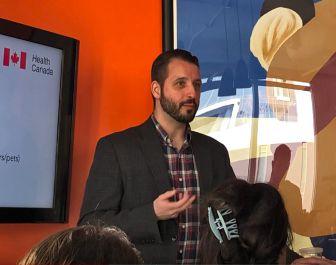

What happens when you bake with cannabis?
(How to do so safely, and legally in Canada.)

Why and what constitutes a safe dosage of cannabis in Canada.
The historical use of cannabis over the centuries:

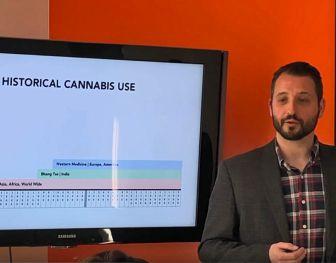
David Brott of The Cannabis Cooking Company discusses the historical use of cannabis throughout the centuries.

Joshua Tuck, CRO and Co-Founder of The Cannabis Cooking Cooking Company discusses why and how to bake with marijuana.
What’s a Cannabidiol?


David Brott talks about differences between CBD and THC, and the new cannabidiols about to hit the market.
As one of less than 10,000 people worldwide to hold a Cannabis Sommelier Certification, Tamara Lillien was recently selected from 25,000 applicants to serve as a member of the world’s first Cannabis Curation Committee. In this short series, she demystifies some of the strains of cannabis and talks about some of their properties.
PART 1
Tamara Lilien discusses what contributes to the flavours and qualities of cannabis.


PART 2
Tamara Lilien, cannabis sommelier discusses the difference between Sativa, Indica and Ruderalis.


PART 3
Tamara Lilien discusses flavour profiles of various strains, and what chefs baking with cannabis might consider when baking with various strains.

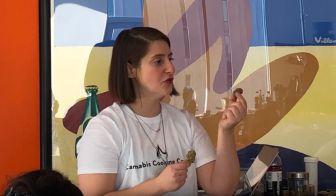
Chicago Metallic Bakeware | Pan Glo
A BUNDY BAKING SOLUTION
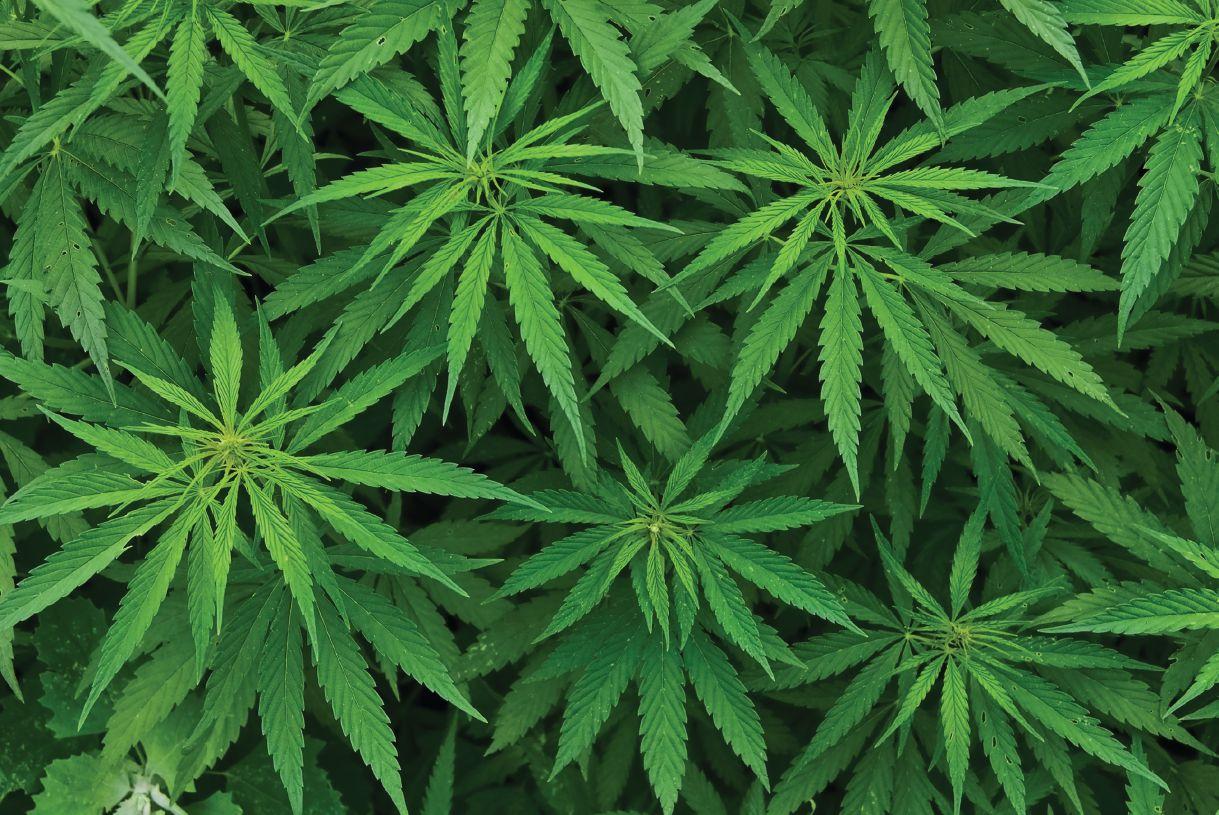
CANNABIS SOLUTIONS from drying to baking

Bundy Baking Solutions is your one stop shop for drying cannabis and baking a wide variety of edibles.
Our Chicago Metallic perforated trays provide the ideal surface to dry cannabis plants. We offer multiple sizes to meet your production needs.
Chicago Metallic also stocks baking pans for the most popular baked edibles including cookies, cupcakes, muffins, breads and a wide range of other products. If we don’t have the exact pan you need, we offer custom pan design services. Each pan is coated with AMERICOAT® ePlus silicone coating to ensure excellent depanning of your products.
When your pans become stained or products begin to stick, contact us about our Pan Glo cleaning and recoating process that is proven to extend the life of your baking pans at a fraction of the cost of new.
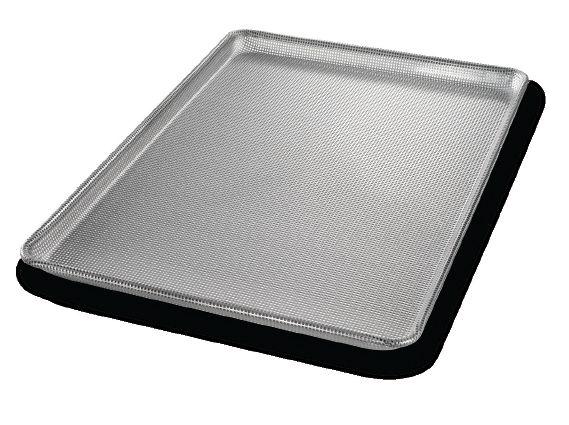
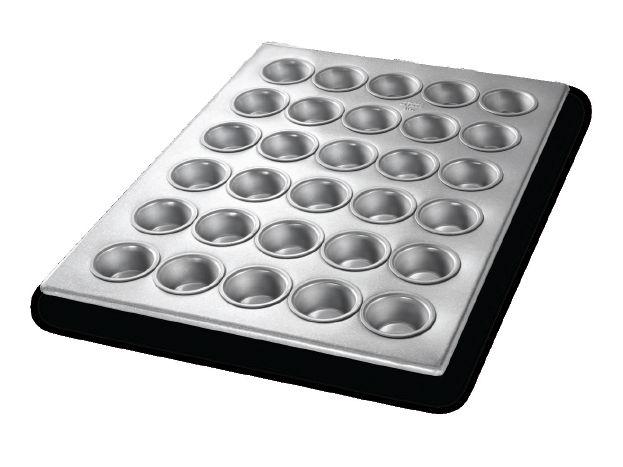
items #44692 & #45195
